-
11-10-2023
Time to act sustainably: Why can’t we wait any longer?
Revista Brasileira de Enfermagem. 2023;76(5):e20220813
Abstract
Time to act sustainably: Why can’t we wait any longer?
Revista Brasileira de Enfermagem. 2023;76(5):e20220813
DOI 10.1590/0034-7167-2022-0813
Views0See moreABSTRACT
Objectives:
to raise reflections on the need for health services and professionals to implement sustainable actions, aiming at their own survival and that of the planet.
Methods:
reflective essay based on international reports regarding the impact of climate change on people’s health and the role of institutions in this context.
Results:
the article focused on three fundamentals: climate change continues to be a threat to the health and well-being of all beings on Earth; the institutions that should contribute to health are great agents of contamination of the environment and emission of gases that aggravate the greenhouse effect; and there are several benefits for health institutions to act sustainably.
Final Considerations:
we cannot wait any longer; we must develop policies and management models aimed at environmentally responsible, economically viable, and socially more collaborative healthcare.
-
REVIEW11-10-2023
Applying Lean Healthcare in the hospitalization and patient discharge process: an integrative review
Revista Brasileira de Enfermagem. 2023;76(5):e20220751
Abstract
REVIEWApplying Lean Healthcare in the hospitalization and patient discharge process: an integrative review
Revista Brasileira de Enfermagem. 2023;76(5):e20220751
DOI 10.1590/0034-7167-2022-0751
Views0See moreABSTRACT
Objectives:
to identify scientific evidence regarding the use of Lean Healthcare approach in the hospitalization and patient discharge process.
Methods:
this is an Integrative Review conducted in the PubMed, LILACS, SCOPUS, CINAHL, Web of Science, and Embase databases.
Results:
out of 904 records identified, three were included in this review. The studies demonstrated that when applied to discharge planning, the Lean philosophy brings favorable results, promoting improvements in the communication process, as well as assisting in workflow organization, with a reduction in length of stay and improvement in the quality of care.
Final Considerations:
although the Lean methodology presents positive results, it is considered that the application of the philosophy in healthcare institutions is still not sustainable, as it is often restricted to specific departments or services. Thus, to maximize the success of implementation, the Lean philosophy needs to be incorporated into the organizational culture, representing the greatest challenge.
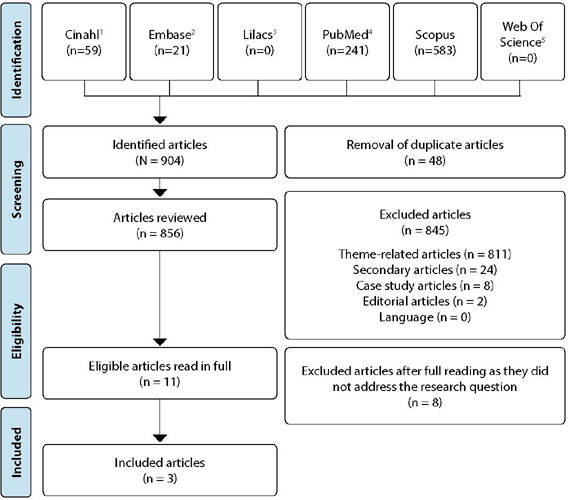
-
11-10-2023
A eficácia do uso de livros interativos multimodalidade em enfermagem pediátrica na implementação do programa Merdeka Belajar
Revista Brasileira de Enfermagem. 2023;76(5):e20220599
Abstract
A eficácia do uso de livros interativos multimodalidade em enfermagem pediátrica na implementação do programa Merdeka Belajar
Revista Brasileira de Enfermagem. 2023;76(5):e20220599
DOI 10.1590/0034-7167-2022-0599
Views0See moreRESUMEN
Objetivos:
analizar la efectividad del uso de libros interactivos multimodales en enfermería pediátrica sobre los resultados de aprendizaje de los estudiantes en la implementación del Programa Merdeka Belajar.
Métodos:
investigación cuasi-experimental con un diseño de grupo de control posterior a la prueba. En este estudio, la muestra incluyó 52 estudiantes de enfermería del cuarto semestre del Instituto de Ciencias de la Salud Suaka Insan Banjarmasin que recibieron el curso de Enfermería Pediátrica. Fue utilizada la técnica de muestreo total y la prueba t dependiente en el análisis de datos.
Resultados:
el libro interactivo multimodal de enfermería pediátrica fue efectivo en la mejora del logro de aprendizaje de los estudiantes de cuarto semestre con un valor de significancia de 0,015 < 0,05. Hay una diferencia en el valor promedio de los cursos de enfermería pediátrica para la clase A y la clase B, que es de 3,173.
Conclusiones:
el uso de libros multimodales interactivos es muy bueno para que los profesores los apliquen en la enseñanza para ayudar a los estudiantes a comprender el material que están aprendiendo.
-
11-10-2023
ERRATA
Revista Brasileira de Enfermagem. 2023;76(5):e2023n5e04
Abstract
ERRATA
Revista Brasileira de Enfermagem. 2023;76(5):e2023n5e04
DOI 10.1590/0034-7167.20237605e04pt
Views0No artigo “Primeira graduada do Mestrado em Enfermagem em Prática Avançada em Oncologia no Chile”, com número DOI: , publicado no periódico Revista Brasileira de Enfermagem, 2023; 2023(Suppl 4):e76suppl401, no segundo parágrafo:Onde se lia:[…]See more -
ORIGINAL ARTICLE11-10-2023
The effectiveness of using interactive multimodality books in pediatric nursing in implementing Merdeka Belajar program
Revista Brasileira de Enfermagem. 2023;76(5):e20220599
Abstract
ORIGINAL ARTICLEThe effectiveness of using interactive multimodality books in pediatric nursing in implementing Merdeka Belajar program
Revista Brasileira de Enfermagem. 2023;76(5):e20220599
DOI 10.1590/0034-7167-2022-0599
Views0See moreABSTRACT
Objectives:
to analyzing the Effectiveness of Using Interactive Multimodality Books in Pediatric Nursing on Student Learning Outcomes in Implementing the Merdeka Belajar Program.
Methods:
the research design used a quasi-experimental approach with a posttest control group design. The sample in this study was the fourth-semester nursing students of Institute of Health Science Suaka Insan Banjarmasin who received the Pediatric Nursing course, a total of 52 students. The sampling technique used is total sampling. Data analysis used the dependent t-test.
Results:
the interactive multimodality pediatric nursing book was effective in improving the learning achievement of fourth-semester students with a significance value of 0.015 < 0.05. There is a difference in the average value of pediatric nursing courses for class A and class B, which is 3.173.
Conclusions:
the use of interactive multimodality books is very good for lecturers to apply in teaching to help students understand the material they are learning.
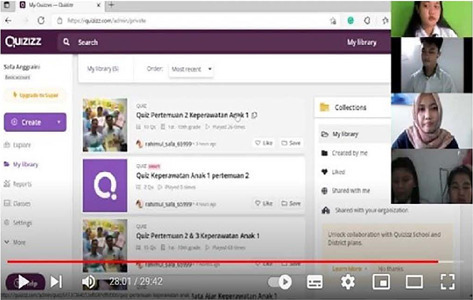
-
ERRATUM11-10-2023
ERRATUM
Revista Brasileira de Enfermagem. 2023;76(4):e2023n4e03
Abstract
ERRATUMERRATUM
Revista Brasileira de Enfermagem. 2023;76(4):e2023n4e03
DOI 10.1590/0034-7167.20237604e03
Views0In the article “Diabetic foot ulcer self-care assessment: a scoping review”, with DOI number: https://doi.org/10.1590/0034-7167-2022-0555, published in Revista Brasileira de Enfermagem, 2023;76(3): e20220555, in the title:Where it read:[…]See more -
ORIGINAL ARTICLE11-10-2023
Validation of the Advanced Practice Nursing Competency Assessment Instrument in a hospital environment
Revista Brasileira de Enfermagem. 2023;76:e20220705
Abstract
ORIGINAL ARTICLEValidation of the Advanced Practice Nursing Competency Assessment Instrument in a hospital environment
Revista Brasileira de Enfermagem. 2023;76:e20220705
DOI 10.1590/0034-7167-2022-0705
Views0See moreABSTRACT
Objectives:
to evaluate the measurement properties of the Advanced Practice Nursing Competency Assessment Instrument – Brazilian version, in the hospital environment.
Methods:
a methodological study conducted in a hospital with 238 nurses. Three instruments collect the data: sample characterization form, Brazilian version of the Advanced Practice Nursing Competency Assessment Instrument, and the category “therapeutic interventions” of the nurse competence scale. Construct validity was verified by confirmatory factor analysis and Spearman’s correlation coefficient, and reliability by Cronbach’s Alpha and composite reliability.
Results:
in the factor analysis, the model converged to a satisfactory result. The study found acceptable evidence of reliability (Cronbach’s Alpha, 0.76-0.87; and composite reliability, 0.85-0.90).
Conclusions:
the instrument demonstrated evidence of construct validity and internal consistency and can be used in practice
-
11-10-2023
Technology for the treatment promotion of adults living with HIV: Positive o Cuidado (Positive the Care)
Revista Brasileira de Enfermagem. 2023;76:e20220454
Abstract
Technology for the treatment promotion of adults living with HIV: Positive o Cuidado (Positive the Care)
Revista Brasileira de Enfermagem. 2023;76:e20220454
DOI 10.1590/0034-7167-2022-0454
Views0See moreABSTRACT
Objectives:
to develop a responsive website focused on treatment adherence for adult users living with HIV.
Methods:
technological study conducted between August and October 2020, in the light of Pierre Lévy’s theoretical-philosophical framework, using the Double Diamond Process methodology associated with the five stages of The Elements of User Experience framework.
Results:
it was developed the responsive website Positive Care (Positive o Cuidado), composed of an initial presentation screen and 13 other screens named: Family Health and You; Undetectable = Untransmissible; Antiretroviral Drugs; Routine Tests; Vaccination; Antiretroviral Delivery; Drug Interactions; Combined Prevention; Support Services; Healthy Life; Family and Reproductive Planning; Covid 19; and Questions, Curiosities, and Myths.
Final Considerations:
the responsive website was developed based on the software design and programming process and has requirements/functionalities with the potential to strengthen the collective intelligence about HIV and, consequently, to promote treatment adherence by its users.
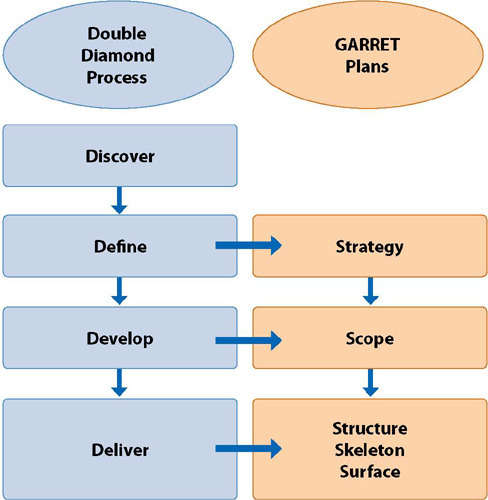
-
ORIGINAL ARTICLE01-30-2023
Adverse dermatoneurological events and impacts on daily activities of patients with gastrointestinal neoplasms undergoing chemotherapy
Revista Brasileira de Enfermagem. 2023;76(1):e20220161
Abstract
ORIGINAL ARTICLEAdverse dermatoneurological events and impacts on daily activities of patients with gastrointestinal neoplasms undergoing chemotherapy
Revista Brasileira de Enfermagem. 2023;76(1):e20220161
DOI 10.1590/0034-7167-2022-0161
Views0See moreABSTRACT
Objective:
to associate the presence and grading of adverse dermatoneurological events (peripheral neuropathy and hand-foot syndrome) and the interference in the activities of daily living of patients with gastrointestinal neoplasms undergoing systemic antineoplastic treatment.
Method:
this is a longitudinal, prospective study, using instruments to assess hand-foot syndrome and peripheral neuropathy.
Results:
there were 36 patients: 66.7% diagnosed with colon cancer and 83.2% on combination therapy. From cycle 5 onwards, all of them had hand-foot syndrome, with a majority of grade 1, unrelated to interference in activities of daily living. Regarding peripheral neuropathy, there was a moderate to strong correlation from cycle 1 of treatment.
Conclusion:
peripheral neuropathy negatively affects activities of daily living. The monitoring of dermatoneurological events by oncology nurses contributes to the clinical practice of nursing and subsidizes the development of advanced practice in the country.
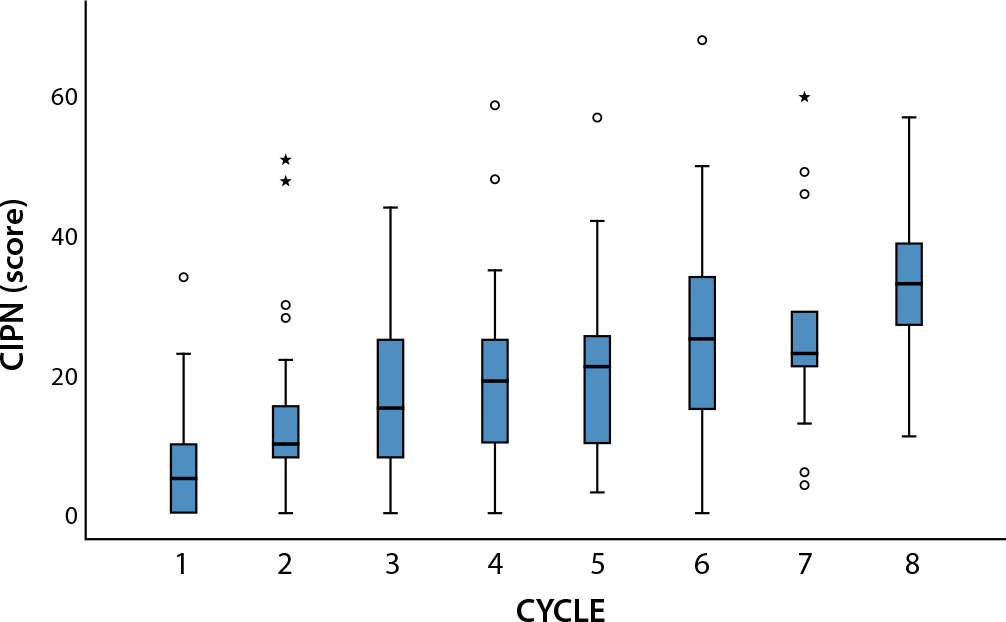
-
ORIGINAL ARTICLE12-16-2023
Elderly Mortality due to Ambulatory Care Sensitive Conditions and Primary Health Care Coverage in the Federal District
Revista Brasileira de Enfermagem. 2023;76(1):e20220170
Abstract
ORIGINAL ARTICLEElderly Mortality due to Ambulatory Care Sensitive Conditions and Primary Health Care Coverage in the Federal District
Revista Brasileira de Enfermagem. 2023;76(1):e20220170
DOI 10.1590/0034-7167-2022-0170
Views0See moreABSTRACT
Objectives:
To describe the mortality coefficients of elderly due to primary care sensitive conditions, from 2008 to 2018, and determine its association with the coverage of the Primary Health Care (Family Health Strategy and Basic Care models) in the Federal District.
Methods:
Ecological time series of mortality in Federal District elderly, from 2008 to 2018. The Poisson regression model was applied, considering as significant those with p<0.05, with a CI of 95%.
Results:
There were 70,503 deaths. There was a decrease in the risk of death of elders due to cardiovascular diseases and diabetes. Higher primary care coverage decreased the chance of death by sensitive conditions, both in Basic Care (OR: 0.994, CI: 0.990-0.998) and in the Family Health Strategy (OR: 0.997, CI: 0.995-0.999).
Conclusions:
Primary Care coverage was associated with a lower chance of death of the elderly due to Ambulatory Care Sensitive Conditions, especially in Basic Care.
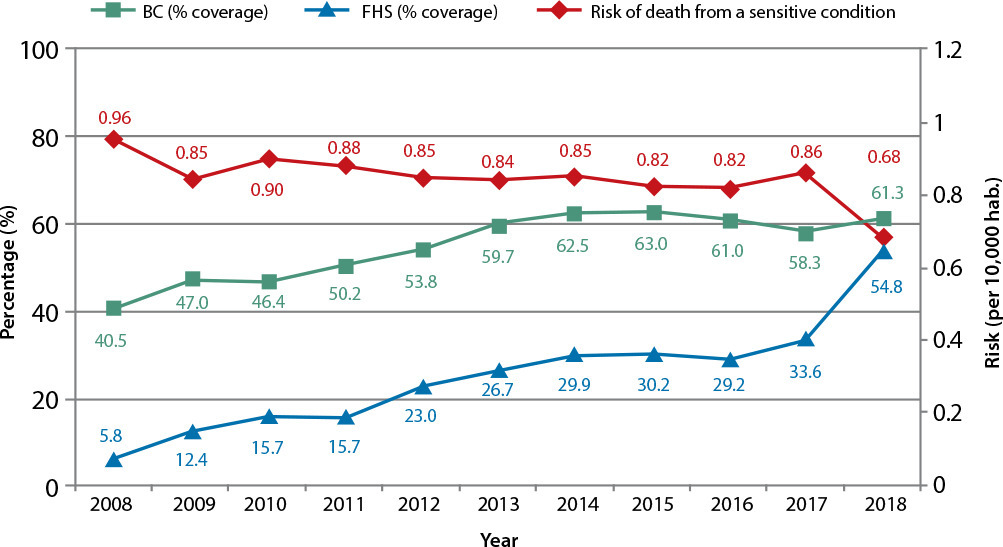
-
ORIGINAL ARTICLE11-28-2023
Syphilis in pregnancy and congenital syphilis: women’s experiences from the perspective of symbolic interactionism
Revista Brasileira de Enfermagem. 2023;76(1):e20220210
Abstract
ORIGINAL ARTICLESyphilis in pregnancy and congenital syphilis: women’s experiences from the perspective of symbolic interactionism
Revista Brasileira de Enfermagem. 2023;76(1):e20220210
DOI 10.1590/0034-7167-2022-0210
Views1See moreABSTRACT
Objectives:
to understand the meanings attributed by women to the diagnosis and treatment of syphilis and congenital syphilis, and to outpatient follow-up of their children.
Methods:
this is a qualitative study conducted with 30 mothers of children with congenital syphilis using audio-recorded semi-structured interviews, which were submitted to inductive thematic analysis. Symbolic interactionism was the theoretical framework considered in this study.
Results:
two themes were identified, showing the maternal diagnosis involved shock, guilt, and fear of social exclusion, in addition to frustration due to failure to prevent vertical transmission. Moreover, the painful clinical procedures for the child’s treatment enhanced maternal guilt, and the symbolic process of re-signification of the disease/treatment took place with the child’s healing.
Final Considerations:
understanding the intersubjective aspects involved in this experience helps nurses rethink their care practice and contributes to their critical role in the context of syphilis.
-
ORIGINAL ARTICLE11-28-2023
Brazilian undergraduate nursing students’ critical thinking need to be increased: a cross-sectional study
Revista Brasileira de Enfermagem. 2023;76(1):e20220315
Abstract
ORIGINAL ARTICLEBrazilian undergraduate nursing students’ critical thinking need to be increased: a cross-sectional study
Revista Brasileira de Enfermagem. 2023;76(1):e20220315
DOI 10.1590/0034-7167-2022-0315
Views0See moreABSTRACT
Objectives:
to map Brazilian undergraduate nursing students’ critical thinking level and investigate the correlation between selected sociodemographic data and critical thinking domains.
Methods:
in this descriptive cross-sectional study, participants’ (N=89) critical thinking was assessed using the Health Science Reasoning Test. Correlation between critical thinking domains and sociodemographic data was assessed using the Pearson correlation coefficient.
Results:
the overall results showed a moderate level of participants’ critical thinking (mean = 70.7; standard deviation 5.7). A poor performance was identified in 5 of the 8 critical thinking domains. A significant positive correlation was found between education period and critical thinking (p<.001).
Conclusions:
poor level in students critical thinking domains may lead to negative consequences for their learning outcomes. Further studies should be carried out to confirm our results, in addition to investigation of teaching methods that encourage and ensure the development of students’ critical thinking skills during nursing education.
-
ORIGINAL ARTICLE02-06-2023
Teaching entrepreneurship in undergraduate Nursing course: evaluation of an educational proposal
Revista Brasileira de Enfermagem. 2023;76(2):e20210244
Abstract
ORIGINAL ARTICLETeaching entrepreneurship in undergraduate Nursing course: evaluation of an educational proposal
Revista Brasileira de Enfermagem. 2023;76(2):e20210244
DOI 10.1590/0034-7167-2021-0244
Views1See moreABSTRACT
Objective:
To evaluate a proposal for teaching entrepreneurship in an undergraduate Nursing course that uses active methodologies and activities based on the theory of meaningful learning.
Methods:
Interventional, prospective study, with a quantitative perspective, with a total of 102 participating students, carried out from July 2017 to December 2019 at a public university in the state of Sao Paulo. Statistical analysis were performed by non-parametric Chi-square or Fisher’s exact tests, with differences considered statistically significant if p < 0.05.
Results:
Improvements were observed in almost all items evaluated, revealing that meaningful learning became more effective with the use of active teaching methodologies. Most students need adaptation and effort to be put into these methods.
Conclusions:
The proposal offers pedagogical content adaptation, specifically for nursing students. New research should expand teaching-learning techniques for the development of future nurses, preparing them adequately for the job market.

-
ORIGINAL ARTICLE03-06-2023
Medication reconciliation in pediatrics: a validation of instruments to prevent medication errors
Revista Brasileira de Enfermagem. 2023;76(2):e20210755
Abstract
ORIGINAL ARTICLEMedication reconciliation in pediatrics: a validation of instruments to prevent medication errors
Revista Brasileira de Enfermagem. 2023;76(2):e20210755
DOI 10.1590/0034-7167-2021-0755
Views0See moreABSTRACT
Objectives:
to develop and validate the content of two instruments for promoting medication reconciliation for the transition of care of hospitalized children.
Methods:
methodological study, conducted in five stages: scope review for conceptual structure; elaboration of the initial version; content validation with five specialists using the Delphi technique; reassessment; and construction of the final version of the instruments. A content validity index of at least 0.80 was adopted.
Results:
three rounds of evaluation were carried out to reach the validity index of the proposed contents, whereas a new analysis of 50% of the 20 items of the instrument aimed at families, and 28.5% of the 21 items aimed at professionals was necessary. The instrument aimed at families reached an index of 0.93, and the instrument for professionals, 0.90.
Conclusions:
the proposed instruments were validated. It is now possible to proceed with practical implementation studies to identify their influence on safety during medication reconciliation at transition of care.

-
ORIGINAL ARTICLE05-08-2023
Precarious work at a surgical center: implications for the organization and for the health of nursing workers
Revista Brasileira de Enfermagem. 2023;76(2):e20220120
Abstract
ORIGINAL ARTICLEPrecarious work at a surgical center: implications for the organization and for the health of nursing workers
Revista Brasileira de Enfermagem. 2023;76(2):e20220120
DOI 10.1590/0034-7167-2022-0120
Views0See moreABSTRACT
Objectives:
to analyze the implications of precarious work for the organization of work and for the health of nursing professionals in a surgical center.
Methods:
qualitative, descriptive study in which the interview technique was applied on 30 nursing professionals from a surgical center in a university hospital located in the Southeast region of Brazil. The project was approved by the research ethics committee. Thematic content analysis was applied in the categorization of speeches.
Results:
precarious work in the surgical center negatively affects the organization of work due to staff turnover, loss of skilled talent, and the need for continuous training of temporary workers. It also affects the quality of care, leading to risks to patient safety and workers’ health.Final Considerations: it is important to make work conditions less precarious in order to minimize staff turnover and promote the quality of the service offered and the health of the worker.
-
ORIGINAL ARTICLE04-07-2023
Suicide attempts by adolescents assisted in an emergency department: a cross-sectional study
Revista Brasileira de Enfermagem. 2023;76(2):e20220137
Abstract
ORIGINAL ARTICLESuicide attempts by adolescents assisted in an emergency department: a cross-sectional study
Revista Brasileira de Enfermagem. 2023;76(2):e20220137
DOI 10.1590/0034-7167-2022-0137
Views1See moreABSTRACT
Objectives:
to identify and characterize the care provided to adolescents admitted to an emergency department due to a suicide attempt.
Methods:
an observational, cross-sectional, descriptive study with a retrospective approach, carried out with medical records of adolescents aged 10 to 19 admitted for suicide attempts, between January 2015 and July 2020, in an emergency department. Data were subjected to descriptive and inferential analysis.
Results:
eighty-eight service occurrences were identified, mainly to females, exposed to multiple risk factors. Exogenous intoxication was the main method used, occurring at home and on weekdays. There were systemic repercussions, requiring multiple interventions and hospitalizations. Only 26% of cases were notified.
Conclusions:
adolescents treated for suicide attempts were exposed to multiple risk factors, with intoxication as the main means used. There is concern about the underreporting of cases and the logic of clinical care and medicalization.
-
ORIGINAL ARTICLE06-29-2020
Hand hygiene in high-complexity sectors as an integrating element in the combat of Sars-CoV-2
Revista Brasileira de Enfermagem. 2020;73:e20200316
Abstract
ORIGINAL ARTICLEHand hygiene in high-complexity sectors as an integrating element in the combat of Sars-CoV-2
Revista Brasileira de Enfermagem. 2020;73:e20200316
DOI 10.1590/0034-7167-2020-0316
Views0See moreABSTRACT
Objective:
to perform a situational diagnosis of the behavior of health professionals concerning hand hygiene practices in highly-complex sectors.
Methods:
this quantitative and retrospective study was based on reports (2016 and 2017) of Adult and Pediatric ICUs of a Federal hospital in Rio de Janeiro.
Results:
one thousand two hundred fifty-eight opportunities for hand hygiene were analysed. The chance of professionals sanitizing hands in Pediatric ICUs is 41.61% higher than in Adult ICUs. Concerning proper hand hygiene, the medical team had a 39.44% lower chance than the nursing team. Others had a 30.62% lower chance when compared to the nursing team. The moment “after contact with the patient” presented 4.5275 times the chance in relation “before contact with the patient”.
Conclusion:
in front of hand hygiene recommendations to control COVID-19, diagnostic assessment and previous analysis of the behavior of professionals proved to be positive.

-
ORIGINAL ARTICLE08-19-2019
Functional capacity and social support to people affected by cerebrovascular accident
Revista Brasileira de Enfermagem. 2019;72(4):868-873
Abstract
ORIGINAL ARTICLEFunctional capacity and social support to people affected by cerebrovascular accident
Revista Brasileira de Enfermagem. 2019;72(4):868-873
DOI 10.1590/0034-7167-2017-0854
Views0See moreABSTRACT
Objective:
To investigate the functional capacity and its relationship with the level of social support to people affected by cerebrovascular accident.
Methods:
Cross-sectional and quantitative research, conducted with 108 individuals with sequelae of cerebrovascular accident in João Pessoa/PB. Data were collected through interviews, using a sociodemographic instrument – the Barthel Index and the Social Support Scale.
Results:
We observed the prevalence of functional dependency in 93.5%, and the mild dependency stood out in 40.7%. Medium social support was the most found, with 48.2%. The predominant dimensions of social support were the material dimension, followed by the emotional. There was a significant association (p ≤ 0.05) between very serious dependency and high social support.
Conclusion:
The results found allow us to reflect on the need for involvement of health professionals in strengthening the social support of patients with disabling diseases, such as the cerebrovascular accident.

-
ORIGINAL ARTICLE08-19-2019
Nursing practice in home care: the mediation of care by reflexivity
Revista Brasileira de Enfermagem. 2019;72(4):956-963
Abstract
ORIGINAL ARTICLENursing practice in home care: the mediation of care by reflexivity
Revista Brasileira de Enfermagem. 2019;72(4):956-963
DOI 10.1590/0034-7167-2018-0431
Views0See moreABSTRACT
Objective:
To analyze the practice of nurses in home care, considering the mediation of care by reflexivity.
Method:
Unique, qualitative case study, anchored in the dialectical framework. The participants were 13 nurses who work in home care in Minas Gerais. Data were obtained by participant observation and interview, and submitted to critical discourse analysis.
Results:
Nursing care at home involves the repetitions of everyday actions and a degree of unpredictability. Reflexivity, according to Schön’s theoretical framework, emerges as a component of professional practice that leads to the practice of care as a continuous assessment of work, and also to reflection on the challenges imposed by conflicting situations. Reflexivity also stems from professionals’ search for improvements in their practices.
Final considerations:
We identified the presence of actions and knowledge mobilized by the reflexivity of the nurse in the home care setting. The following were the elements of this reflexive practice: knowing-in-action, reflection-in-action and reflection reflection-in-action.
-
ORIGINAL ARTICLE10-18-2022
Adherence to antiretroviral therapy by adults living with HIV/aids: a cross-sectional study
Revista Brasileira de Enfermagem. 2022;75(2):e20210019
Abstract
ORIGINAL ARTICLEAdherence to antiretroviral therapy by adults living with HIV/aids: a cross-sectional study
Revista Brasileira de Enfermagem. 2022;75(2):e20210019
DOI 10.1590/0034-7167-2021-0019
Views0See moreABSTRACT
Objective:
To verify the association between adherence to antiretroviral treatment by adults with HIV/AIDS and sociodemographic factors, social and clinical support.
Methods:
Cross-sectional study, with a quantitative approach. Participation of 230 patients. Questionnaires of sociodemographic characterization, social and clinical support, and assessment of adherence to antiretroviral treatment were used. Descriptive and inferential statistics were performed.
Results:
Adherence was classified as good/adequate. An association with sex, income, employment, and level of education was noted. In social support: having access to health services; communication with health professionals; health education; having support to allow venting/talking about issues; information on HIV/AIDS; and company for leisure. In the clinical profile: non-interruption of the drug treatment due to absence from the service or due to changes in the medical prescription.
Conclusion:
Adherence was classified as good/adequate and especially associated with social support factors, which should be enhanced in clinical practice.
-
ORIGINAL ARTICLE03-30-2020
Professional skills for health promotion in caring for tuberculosis patients
Revista Brasileira de Enfermagem. 2020;73(2):e20180943
Abstract
ORIGINAL ARTICLEProfessional skills for health promotion in caring for tuberculosis patients
Revista Brasileira de Enfermagem. 2020;73(2):e20180943
DOI 10.1590/0034-7167-2018-0943
Views0See moreABSTRACT
Objectives:
to understand the health promotion skills found in the speeches of health practitioners in care for TB patients.
Methods:
qualitative study, developed with seven practitioners involved in care for TB patients, identified from a sociocentric approach, whose speeches were submitted to analysis based on the health promotion skills model in the Galway Consensus.
Results:
there were four domains: Catalyzing change; Leadership; Planning; and Partnerships. These domains resulted from health education actions, contribution of management nursing practitioners, seeking to meet patients’ needs and articulation of professional sectors.
Final considerations:
there were some skill domains in the speeches of health practitioners, with the nurse being quoted in the development of essential skills for health promotion activities, such as catalyzing change and leading care for TB patients.
-
01-27-2020
Comparison of Interpretive Description and Qualitative Description in the Nursing Scope
Revista Brasileira de Enfermagem. 2020;73(1):e20190339
Abstract
Comparison of Interpretive Description and Qualitative Description in the Nursing Scope
Revista Brasileira de Enfermagem. 2020;73(1):e20190339
DOI 10.1590/0034-7167-2019-0339
Views0Interpretive Description BasisID is a small scale qualitative research about a phenomenon regarded in the field that aims to extract themes and patterns. This approach begins with the critical analysis of clinical and theoretical knowledge in the field. It develops the initial conceptual framework, however it does not enter procedures details. Instead, this approach explains […]See more -
ORIGINAL ARTICLE06-04-2021
Information demands from families of children with Autism Spectrum Disorder
Revista Brasileira de Enfermagem. 2021;74(5):e20200642
Abstract
ORIGINAL ARTICLEInformation demands from families of children with Autism Spectrum Disorder
Revista Brasileira de Enfermagem. 2021;74(5):e20200642
DOI 10.1590/0034-7167-2020-0642
Views0See moreABSTRACT
Objective:
to identify the information demands of families of children with Autism Spectrum Disorder.
Method:
this is a qualitative study conducted through semi-structured and audio-recorded interviews with 55 family members, in the states of Paraná, Ceará, and Macapá, between September 2018 and September 2019. Thematic category analysis and Qualitative Data Analysis Software resources were used for data organization.
Results:
it was identified that families need information regarding the characteristics of Autism Spectrum Disorder (definition, cause, possibility of cure, prognosis and the probability of having another child with Autism Spectrum Disorder); child’s routine and behavior; future rights and expectations.
Final considerations:
information demands are relevant to support professionals, health managers and other services in health care organization to support families of children with autism.
-
ORIGINAL ARTICLE07-31-2020
Educational demands of family members of children with special health care needs in the transition from hospital to home
Revista Brasileira de Enfermagem. 2020;73:e20190156
Abstract
ORIGINAL ARTICLEEducational demands of family members of children with special health care needs in the transition from hospital to home
Revista Brasileira de Enfermagem. 2020;73:e20190156
DOI 10.1590/0034-7167-2019-0156
Views0See moreABSTRACT
Objectives:
to analyze the educational demands of family members of children with special health care needs in the transition from hospital to home
Methods:
qualitative research conducted between February and June 2018, using the handbook on creativity and sensitivity dynamics, from the sensitive creative method; the participants were nine family caregivers of children admitted to a public hospital in Rio de Janeiro; the data were subjected to French discourse analysis
Results:
the educational demands were clinical, centered on the categories complex and continuous care, technological care, modified habits, medication, development and mixed care, and social, related to the supplies and rights of children
Final Considerations:
the social educational demand has emerged as a new demand to be incorporated in the care of these children. The transition from hospital to home should be progressive and have the nurse as its coordinator, with the objective of providing participatory, safe, quality care, articulated within a social network
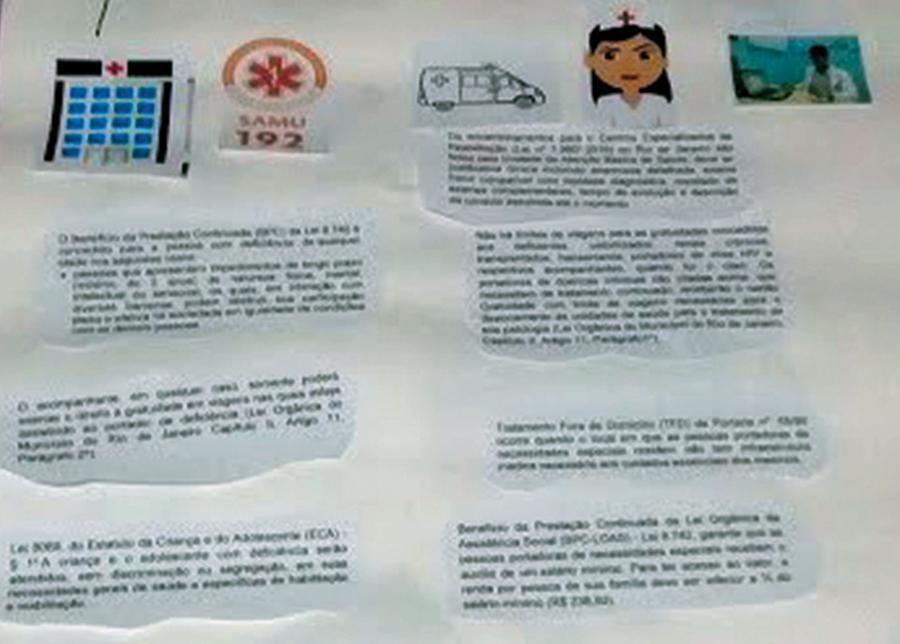
Search
Search in:
Nuvem de Tags
Adolescente (85) Atenção Primária à Saúde (239) COVID-19 (91) Criança (91) Cuidados de Enfermagem (269) Educação em Enfermagem (151) Educação em Saúde (139) Enfermagem (930) Enfermagem Pediátrica (86) Estudantes de Enfermagem (77) Estudos de Validação (131) Família (87) Idoso (208) Promoção da Saúde (99) Qualidade de Vida (104) Saúde do Trabalhador (86) Saúde Mental (145) Saúde Pública (82) Segurança do Paciente (150) Tecnologia Educacional (100)



